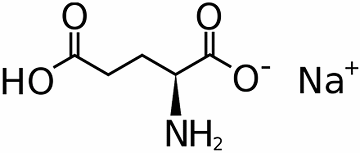
SAFARI
Users
- General & History
- Chinese Restaurant Syndrome
- MSG and Migraine Headaches
- MSG & Obesity / Type II Diabetes - Now this is scary!
- Links
General & History
Monosodium Glutamate
was first identified in 1909 in seaweed extract, a substance long used in Japan as a flavor enhancer. It was immediately patented and put into production by the newly formed Ajinomoto company,While MSG was, in the past, associated with Chinese restaurants, today per capita consumption is higher in North America than it is in Asia. It is applied to nearly all processed foods (including canned vegetables), snack foods and fast food. It is used in restaurants of all types, fast food, family and upscale gourmet - and they'll all deny it until forced to reveal the ingredient list. The only place you have a chance of getting a meal low in MSG is in one of the Asian restaurants advertising "No MSG", but there'll be some hiding there too.
Monosodium glutamate has two forms, L-glutamate and D-glutamate. Only L-glutamate has flavor enhancing properties, and the manufactured product is about 99.6% L-glutamate.
Natural Occurrence:
Monosodium glutamate is found in fermented products such as soy sauce and Worcestershire sauce in about the same concentration as in MSG-added products, but it is only about 95% L-glutamate. It also occurs in mushrooms and some vegetables.Concealment:
Knowing that many people would like to avoid MSG, the food industry hides it with alternative names. Among these are "Hydrolyzed Vegetable Protein", "Natural Flavor", "Natural Meet Tenderizer", "Autolyzed Yeast" and "Hydrolyzed Pea Protein" (M9). The phrase "No Added MSG" is illegal but used because it is no longer much enforced. It is a sure sign that ingredients used to make the product included MSG.Chinese Restaurant Syndrome
Back in 1968 it was noted that people who had just dined at a Chinese restaurant could show a number of symptoms. These were thought to be caused by Monosodium Glutamate - and at the time Chinese restaurants were the place one was most likely to get exposed to MSG. The symptoms were normally mild but could sometimes be very severe, and could be any one, any combination of, or all of the following:
- Chest pain
- Flushing
- Headache, including migraine
- Numbness or burning in or around the mouth.
- Sense of facial pressure or swelling.
- Sweating.
- Abnormal heart rhythm.
- Shortness of breath.
- Swelling of lips and throat
Since that time, this assignment of blame has been hotly debated. Studies have not provided a consistent answer, particularly since only a minority of people say they experience these symptoms and the symptoms can be very inconsistent from day to day. Nonetheless, the FDA continues to get many anecdotal reports of these symptoms from MSG exposure.
Contributing to the complexity and difficulty in coming up with a consistent answer in either direction is that MSG, very similar to important neurotransmitter glutamine, is one of the few substances that can easily cross the blood-brain barrier. What it does when it gets there is very hard to say. Nonetheless, most studies have yielded a negative outcome (M6), but many people remain unconvinced.
MSGTruth.org suggests "American Restaurant Syndrome" because MSG is now more prevalent (and less avoidable) in American restaurants than in Asian. They list KFC as the very worst offender, with Burger King trailing in second place.
MSG & Migraine Headaches
Some persons subject to migraine headaches say they are touched off by MSG. Once again the reports are persistent and insistent, but anecdotal. Studies have failed to find a consistent link, as did a recent study conducted at the University of Putra, Malaysia (M8). Note, though, there's a little hedging with phrases like "in the general population" and "consistent evidence".
MSG & Obesity / Type II Diabetes
This one is downright scary. To study obesity and type II diabetes scientists need obese rats with type II diabetes. Rats are naturally resistant to obesity and diabetes.
Newly born rats are injected with MSG. By 60 weeks of age they are diabetic. obese, partially blind from cataracts and have other serious health problems (M3). This has been known since at least 1978 and it apparently carries over to humans consuming MSG, at least to an extent.
The FDA considers MSG GRAS (Generally Regarded as Safe) and places no limits on how much is in processed or prepared foods. They claim it is safe in any quantity.
Links
- M1 - MSG Side Effects - Glycemic-index.org - MSG Side Effects and Dangers
- M2 - Is MSG bad for you? - Mayo Clinic.
- M3 - MSG & Obese Rats - Experimental Physiology - Sensory and autonomic nerve changes in the monosodium glutamate-treated rat: a model of type II diabetes
- M4 - MSG & Obesity - Advanced Health Plan - The Scientifically Proven Negative Effects of MSG
- M6 - Chinese Restaurant Syndrome - The Journal of Nutrition - Review of Alleged Reaction to Monosodium Glutamate and Outcome of a Multicenter Double-Blind Placebo-Controlled Study.
- M8 - MSG & Headaches - Food Navigator - Scientists dismiss MSG-headache link.
- M9 - Hidden MSG - truthinlabeling.org - MSG is sometimes hidden in food with labels that say "No Added MSG," "No MSG Added," and "No MSG".


